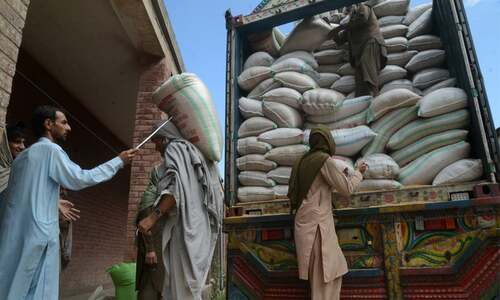USING the deputy commission’s property valuation rates as a benchmark, the Federal Board of Revenue has formulated new tables that would help the tax authorities improve revenues from capital gain and stamp duty. The new table is effective from July 31.
The revised tables may help document the economy a bit better and perhaps may also divert some speculators from the property market towards alternative productive pursuits.
The timing of the move is also appropriate as the current accelerating economic growth rate would offer surplus capital at least some lucrative outlets.
What is disturbing is the emerging trend towards centralisation as witnessed in the delay of the new NFC award, and the regular meetings of the Council of Common Interest not being convened as constitutionally mandated
It can also be hoped that the current speculative trend will be reversed and facilitate the building of more houses and apartments at affordable prices for those seeking shelter. With skyrocketing property prices even the upper middle class had been finding it difficult to own a house.
However, by revising tables, a responsibility vested in the deputy commissioner, the FBR has taken over the functions of the provincial and local governments for property valuation.The new table was formulated with the agreement/consultation of stakeholders in the property business.
But why was a city’s deputy commissioner allowed to retain property valuation power for so long?. It was because property tax was supposed to be a local tax and did not fall either in the domain of the federal or provincial governments. Every city has its own specific problems, more complex now, and it was thought that the matter should be dealt with at the district level to finance civic facilities.
The district governments — often defunct, mostly bereft of representative democracy, or dysfunctional for whatever reasons — have been run by bureaucrats for most of the time. This resulted in the property valuing authority remaining vested with the deputy commissioner, and the valuation table not being revised frequently to update it with market rates.
Then the collection of property tax was taken over by the provincial government. Over time all local taxes were abolished; the local bodies, initially funded by the federal government, are now being financed by the provincial governments. The district governments have no right to raise taxes, and they have their responsibilities spelt out by bureaucrats and the provincial political leadership.
Given the pathetic provincial mode of planning, allocation and disbursements of earmarked funds for projects involving cumbersome procedures, project delays and cost overruns have become a normal business. In fact Sindh’s development spending during the first nine months of the last fiscal year was moving at a slower pace than the previous year, though this trend has made no difference to the Sindh government’s appetite to centralise decision-making at the provincial level.
To make service delivery meaningful and to resolve multiple city problems with growing populations, the previous authority to tax should be restored to the district governments and they should be made accountable to the taxpayers in their constituency. The absence of strong representative district governments is widening the disconnect between governments and the people at the grassroots.
Given this background, the FBR did consult real estate representatives but did not feel it necessary to take local or provincial representatives on board. This is how institutions are destabilised and their capacity to deliver weakened: by over-centralised decision-making. Worse still is the position taken by Punjab and Sindh in delaying the installation of representative local governments; even with much reduced powers than they had enjoyed under Musharraf’s regime.
While often centralisation or devolution in decision-making may be required, depending on the nature of the problems arising from the march of events, it is still necessary that such a move must have all stakeholders on board for joint action. In such cases it would be better for the federal authorities to offer guidance and expertise for capacity building of local and provincial governments where-ever possible.
However, what is disturbing is the emerging trend towards centralisation as witnessed in the delay of the new NFC award, and the regular meetings of the Council of Common Interest not being convened as constitutionally mandated.
No doubt the provinces also need to further improve their performance with so much administrative, legislative and fiscal autonomy given to them by the last NFC award and the eighteenth amendment.
The combined provincial revenues posted a hefty growth of 27pc, but the provinces produced a combined budget surplus of Rs221bn during July-March 2016.
Their fund absorbing capacity is not picking up fast enough for budget surpluses to be fully and effectively utilised for development spending. Hence the provinces also need to step up their efforts to put their house in order.
Published in Dawn, Business & Finance weekly, August 8th, 2016












































Dear visitor, the comments section is undergoing an overhaul and will return soon.